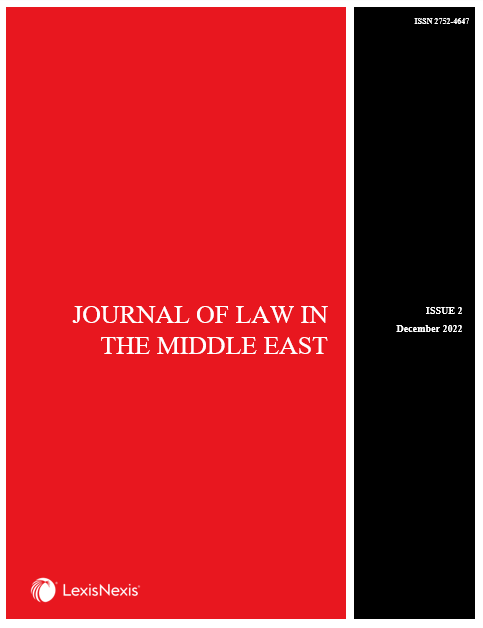Archives
-

Journal of Law in the Middle East
No. 2 (2022)Editor’s Note
Welcome to the second issue of the Journal of Law in the Middle East by LexisNexis!
The Journal of Law in the Middle East by LexisNexis is an open-access and peer-reviewed academic journal dedicated to discussing the multitude of legal systems present in the Middle East, including Islamic Law, Common Law, and Civil Law. Our first issue was published in September 2021, and we are delighted to be continuing with the Journal this year.
We are very grateful for the numerous authors submitted their research for consideration in this year’s edition of the Journal. After reviewing each of the submissions carefully, LexisNexis, along with our Editorial Board and Peer Reviewers, have selected the most compelling pieces for publication.
In this issue, we begin with an analysis of the interactions between modern arbitration laws and Islamic Sharia in Saudi Arabia. Then, a poignant overview is provided of the legal landscape of family businesses in the UAE, along with a creative suggested solution to resolve executive family succession.
The essays included in this issue span across a number of topics and jurisdictions. A discussion of National Human Rights Institutions in the UAE is followed by a critical review of the intentions of Saudi Arabian legislators in the drafting of subarticle 3(5) of the Saudi Arabian Anti-Cybercrime Law.
Lastly, we are proud to present the winning submission of the inaugural LexisNexis Middle East Student Essay Competition in partnership with Middlesex University Dubai. The submission evaluates the legal and ethical considerations of the application of artificial intelligence, with a focus on the Middle East.
At LexisNexis, we know that by providing free and unrestricted access to our Journal, we can contribute to the flourishment of the academic community in the Middle East and the creation of a more equitable knowledge system that is accessible to all.
We would like to extend our deepest gratitude to our Editorial Board, our authors, and our peer reviewers for their time and expertise, without which publication of this Journal would not be possible. We would also like to thank our thousands of readers for their interest and commitment to the scholarship presented by the Journal of Law in the Middle East.
As always, please do not hesitate to contact me should you have any questions about the Journal. Whether you would like to discuss an opportunity with the Editorial Board, a piece you would like to submit, or even the content of one of our published articles, I would be happy to connect with you.
Ellen McClure, Editor-in-Chief of the Journal of Law in the Middle East by LexisNexis
-

Journal of Law in the Middle East by LexisNexis
No. 1 (2021)Welcome to the inaugural issue of the Journal of Law in the Middle East by LexisNexis!
We begin our first issue with an overview of the developments in arbitration in the United Arab Emirates throughout 2020. Despite the pandemic, an onslaught of critical case law in the DIFC made for an eventful year in the arbitration landscape. Our next article delves into the famed Libyan Al-Kharafi case, with a particular focus on the annulment of the award in the Egyptian courts.
Have you ever wondered what pineapples have to do with Islamic criminal law? Find out in our first essay, where the compatibility of modern human rights with ancient Sharia law is discussed. Next, discover the potential for growth within the NILEX in Egypt based on an evaluation of the current laws and regulations.
Our Case Notes, which are a unique type of publication in the Middle East, offer practical insight into these case law developments. We are proud to partner with ADERSO Law Firm in Egypt to publish the winning piece of their 2021 Writing Competition on the SCA vs. Evergreen case, in relation to the Suez Canal blockage that gripped the global economy earlier this year. Lastly, the approach of the Egyptian courts to the United Nations Convention on Contracts for the International Sale of Goods (CISG) is briefly explored.




